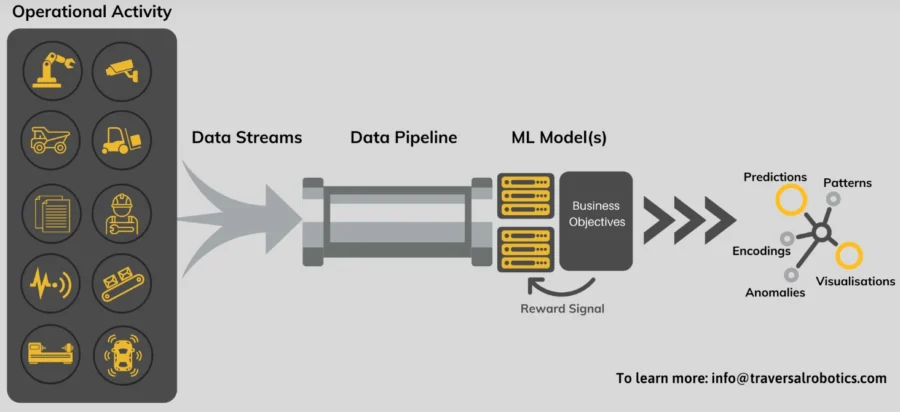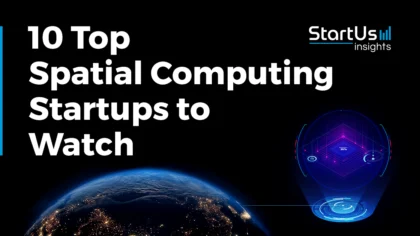Discover the top spatial computing startups driving innovation across industries. This article highlights 10 companies revolutionizing sectors like maritime training, medical imaging, immersive gaming, and industrial productivity. From VR platforms to 3D spatial mapping, these startups are reshaping how we interact with the digital and physical worlds, with key innovations and collaborations fueling their growth.
10 Spatial Computing Startups to Watch in 2025
- CyberDyme – Enterprise Spatial Computing Platform
- Artemis Immersive – Spatial Medtech
- Captic – Virtual World
- XGRIDS – Real-time Scanning & Modeling Device
- 3DtoMe – Digital Twin
- STRUQT – Geospatial AR
- Visutate – Immersive Wellness App
- Traversal Labs – Vision AI For Industrial Productivity & Safety
- Between – Attention-based Audio
- Afference – Wearable Neural Interface
Global Startup Heat Map highlights 10 Spatial Computing Startups to Watch
Through the Big Data & Artificial Intelligence (AI)-powered StartUs Insights Discovery Platform, covering over 4 760 120+ startups & scaleups globally, we identified 1440+ spatial computing startups.
The Global Startup Heat Map below highlights the 10 spatial computing startups you should watch in 2025 as well as the geo-distribution of all 1440+ startups & scaleups we analyzed for this research.
Based on the heat map, we see high startup activity in London and New York City, followed by Bangalore. These spatial computing startups work on solutions ranging from enterprise spatial computing platforms and spatial medtech to real-time scanning and modeling devices and digital twins.
As the world’s largest resource for data on emerging companies, the SaaS platform enables you to identify relevant technologies and industry trends quickly & exhaustively. Based on the data from the platform, the Top 5 Spatial Computing Startup Hubs are in London, New York City, Bangalore, San Francisco & Los Angeles.
The 10 hand-picked startups highlighted in this report are chosen from all over the world and develop solutions for geospatial AR, wearable neural interface, attention-based audio, immersive wellness apps, and more.
Explore 10 Spatial Computing Startups to Watch in 2025
1. CyberDyme
- Founding Year: 2020
- Location: Los Angeles, California, USA
- Use For: Immersive Training
US-based startup CyberDyme offers spatial computing platforms for the maritime industry. Its platform for employee training, wellness, and recruitment, VRhr, uses virtual reality (VR) simulations to create tailored interactive learning environments. This improves employee engagement and prevents distractions.
Another platform, VRtour, provides real-time immersive experiences for employees while allowing trainers to observe their headset activity. It offers prompt support when needed and enhances the understanding of the concepts being taught.
Further, CyberDyme signed a business consignment agreement with the New Energy and Industrial Technology Development Organization for developing next-gen smart mobility solutions.
2. Artemis Immersive
- Founding Year: 2023
- Location: London, UK
- Use For: Accurate Patient Diagnosis
UK-based startup Artemis Immersive’s app, VoxScan, creates interactive 3D computed tomography (CT) and magnetic resonance imaging (MRI) scans of patients. These detailed visuals facilitate healthcare providers (HCPs) to identify issues accurately and better explain diagnoses and treatment options to patients.
Further, the startup’s other solution, Virtual Speaker, enables communications between HCPs and patients, and immersive medical training. This improves patient satisfaction as well as coordination among medical staff.
3. Captic
- Founding Year: 2021
- Location: Vienna, Austria
- Use For: Immersive Gaming
Austrian startup Captic allows users to create personalized 3D virtual environments for the gaming industry. Its web-based engine allows easy accessibility of virtual spaces in real-time on multiple devices.
The engine utilizes a faster graphics processing unit (GPU) to reduce delays and enrich the online experience. Further, it offers higher frame rates and improves the performance of the gaming worlds and consequently, user experience.
4. XGRIDS
- Founding Year: 2020
- Location: Hong Kong
- Use For: 3D Spatiotemporal Intelligence
Chinese startup XGRIDS provides a real-time scanning and modeling device, Lixel L2 Pro. It deploys rotating light detection and ranging (LiDAR), panoramic vision, 60 degrees of freedom inertial measurement unit (IMU), and AI to deliver precise point cloud data for accurate mapping.
Lixel L2 Pro’s multi-simultaneous localization and mapping (SLAM) algorithm also ensures mapping in challenging environments, such as subways and tunnels.
Further, the startup offers point cloud processing software, Lixel Studio, for viewing and editing the captured data. Its Lixel CyberColor generates 3D models based on multi-SLAM and 3D game studio (3DGS) technology.
5. 3DtoMe
- Founding Year: 2023
- Location: Milan, Italy
- Use for: 3D Visualization
Italian startup 3DtoMe uses object recognition to create interactive 3D models of items. This allows users to zoom, rotate, and view them from multiple angles, which improves product comprehension and aids purchasing decisions.
It supports placing the 3D model in augmented reality (AR) and VR devices for immersive exploration. Object recognition also allows AI integration with 3D models for text-to-speech-based product descriptions, eliminating the need to read screens.
The startup’s solution enables e-commerce businesses to directly embed created 3D models into their websites to improve user experience.
Interested in exploring 1440+ spatial computing startups & scaleups?
6. STRUQT
- Founding Year: 2021
- Location: Maastricht, Netherlands
- Use For: Mobile-based AR Experiences
Dutch startup STRUQT develops a cloud-based smartphone app, Kyck, for creating and sharing geospatial AR experiences. The app deploys location-based AR and crafts 3D visualization of objects and multimedia content.

This further allows businesses to offer promotions or information tailored to a user’s physical location for creating engaging, location-based marketing experiences.
7. Visutate
- Founding Year: 2022
- Location: San Jose, California, USA
- Use For: Immersive Meditation
US-based startup Visutate builds an AR-based immersive wellness app. The app introduces soothing virtual environments in 8D audio to provide a highly engaging experience.
It adjusts content based on user progress, allowing them to experience wellness practices tailored to their mood, stress levels, or specific wellness goals.
The app also features visually guided breathing exercises, via Breath Buddy, for users to ease anxiety and improve sleep.
8. Traversal Labs
- Founding Year: 2021
- Location: Newcastle, Australia
- Use For: Data-Driven Industrial Automation
Australian startup Traversal Labs’ spatial computing platform, MotionLogic, advances industrial productivity and safety through intelligent vision. It utilizes camera-based perception, machine learning, and signal processing to gather insights from industrial processes.

Using its scene-understanding technology, the platform converts captured video feeds into actionable reports. Analyzing these reports allows industries, like manufacturing and logistics, to understand current processes and improve them.
Further, MotionLogic prevents waiting or excess motion on the shop floor by analyzing movement patterns and offering layout recommendations.
9. Between
- Founding Year: 2020
- Location: Toronto, Canada
- Use For: Noise-Free Remote Meetings
Canadian startup Between provides immersive audio solutions for hybrid and remote meetings. The startup’s application programming interface (API) brings echo-free audio in AR, VR, and mixed reality (MR) environments.
For this, it leverages spatial data and machine learning to separate and amplify the voice the user wants to hear. It also adapts to changing network conditions to provide a steady flow of audio.
10. Afference
- Founding Year: 2022
- Location: Boulder, Colorado, USA
- Use For: Tactile Feedback
US-based startup Afference works on a wearable neural simulator, The Phantom. It is a haptic glove that generates tactile sensations in the user’s fingers in response to digital interactions.
Their product, the Afference Ring, employs neural haptics to generate artificial touch sensations. The ring consists of a solid-state actuator with no moving parts, is lightweight, wireless, and consumes very little power.
This innovation enables users to perceive tactile feedback from various digital devices, including VR/AR systems, gaming consoles, and mobile phones, enhancing the realism of virtual interactions.
Further, Afference raised USD 3.5 million in a seed round with investments from Hannah Grey VC, Konvoy, and Samsung Next.
Discover All Emerging Spatial Computing Startups
The 1440+ spatial computing startups showcased in this report are only a small sample of all startups we identified through our data-driven startup scouting approach.
Download our free Industry Innovation Reports for a broad overview of the industry or get in touch for quick & exhaustive research on the latest technologies & emerging solutions that will impact your company in 2025!
We seek partnerships with industry experts to deliver actionable insights into startups and tech. Interested? Let us know!




![Explore the 10 Top Startups to Watch in Stuttgart [2025]](https://www.startus-insights.com/wp-content/uploads/2025/02/SharedImg-StartUs-Insights-noresize-420x236.webp)
![Explore the 10 Top Startups to Watch in Dublin [2025]](https://www.startus-insights.com/wp-content/uploads/2025/02/Dublin-Startups-SharedImg-StartUs-Insights-noresize-420x236.webp)
![Explore the 10 Top Tech Startups to Watch in Hong Kong [2025]](https://www.startus-insights.com/wp-content/uploads/2025/02/Hong-Kong-Tech-Startups-SharedImg-StartUs-Insights-noresize-420x236.webp)




